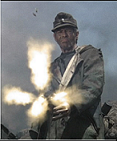Capt. Harlock
Posts: 5358
Joined: 9/15/2001
From: Los Angeles
Status: offline

|
150 Years Ago Today:
Although he had been born as John Rowlands in Wales, the man who would become the 19th Century's most famous newspaper correspondent made his way to America at age 18 and changed his name to Henry Morton Stanley. It was under this name that he would eventually speak the immortal line, "Dr. Livingstone, I presume?". On this date, however, that was in the future. He had joined a unit of the Confederate Army called the Dixie Greys, which was preparing to attack Grant's army at Pittsburgh Landing:
Day broke with every promise of a fine day. Next to me, on my right, was a boy of seventeen, Henry Parker. I remember it because, while we stood-at-ease, he drew my attention to some violets at his feet, and said, "It would be a good idea to put a few in my cap. Perhaps the Yanks won't shoot me if they see me wearing such flowers, for they are a sign of peace." . . .
We loaded our muskets, and arranged our cartridge-pouches ready for use. Our weapons were the obsolete flint-locks, and the ammunition was rolled in cartridge-paper, which contained powder, a round ball, and three buckshot. When we loaded we had to tear the paper with our teeth, empty a little powder into the pan, lock it, empty the rest of the powder into the barrel, press paper and ball into the muzzle, and ram home. Then the Orderly-sergeant called the roll, and we knew that the Dixie Greys were present to a man.
On the Northern side, Grant and Sherman had both been remarkably careless. They assumed that the Rebels were still twenty-five miles (40 km) away in Corinth, Mississippi. The Confederate morning attack caught them and most (but not all) of the Union army by surprise. Southern commander Albert Sydney Johnston's plan had been to attack most strongly on his right or eastern side, driving the Northerners away from the Tennessee river and into swampy area. But he decided to lead some of his units personally, leaving the coordination to General Pierre Beauregard, who had his own ideas. In any case, the Union defense stiffened, units became intermingled, and overall direction was soon lost.

Sherman had suffered something much like a nervous breakdown in 1861, and it wouldn't have been surprising if he had snapped under the surprise attack. But the opposite happened. He performed amazingly well, seeming to be everywhere his men needed him, and refusing to leave the field after being wounded twice and having three horses shot from under him.
The remnants of two Union divisions pulled themselves together and established a defensive position known forever after as "The Hornets' Nest". Though the Federals on either side were pushed back, the Southerners kept attacking the position head-on instead of going around. The carnage soon intensified to levels even beyond anything at Bull Run, as Stanley later described:
The world seemed bursting into fragments. Cannon and musket, shell and bullet, lent their several intensities to the distracting uproar... I likened the cannon, with their deep bass, to the roaring of a great heard of lions; the ripping, cracking musketry, to the incessant yapping of terriers; the windy whisk of shells, and zipping minie bullets, to the swoop of eagles, and the buzz of angry wasps. All the opposing armies of Grey and Blue fiercely blazed at each other.
After being exposed for a few seconds to this dreadful downpour, we heard the order to "Lie down, men, and continue your firing!" Before me was a prostrate tree, about fifteen inches in diameter, with a narrow strip of light between it and the ground. Behind this shelter a dozen of us flung ourselves. The security it appeared to offer restored me to my individuality. We could fight, and think, and observe, better than out in the open. But it was a terrible period! How the cannon bellowed, and their shells plunged and bounded, and flew with screeching hisses over us! Their sharp rending explosions and hurtling fragments made us shrink and cower, despite our utmost efforts to be cool and collected. I marvelled as I heard the unintermitting patter, snip, thud, and hum of the bullets, how anyone could live under this raining death. I could hear the balls beating a merciless tattoo on the outer surface of the log, pinging vivaciously as they flew off at a tangent from it, and thudding into something or other, at the rate of a hundred a second. One, here and there, found its way under the log, and buried itself in a comrade's body. One man raised his chest, as if to yawn, and jostled me. I turned to him, and saw that a bullet had gored his whole face, and penetrated into his chest. Another ball struck a man a deadly rap on the head, and he turned on his back and showed his ghastly white face to the sky...

At around 2:30 in the afternoon, bad luck struck the Confederate side. General Johnston was hit in the leg, quite possibly by an errant Rebel bullet. The wound did not appear very serious at first, so Johnston sent his surgeon away to deal with other wounded first. But in fact an artery had been severed, though masked by Johnston's boot. The surgeon returned in less than an hour, but by that time the Southern commander had bled to death. He was the most senior general to be killed in the entire Civil War.
The Hornets' Nest had withstood at least eight and possibly as many as fourteen charges. Finally the Confederates lined up fifty cannon, and pounded the Northerners until their commander raised the white flag. 2,300 prisoners were taken, but they had bought an invaluable seven hours. Grant had managed to establish a strong defensive line running from a bridge on the Tennessee to Owl Creek, boasting about fifty cannons of his own. The Southerners made one attack, but it not only ran into heavy fire from Grant's forces, but enfilade fire from two Union gunboats on the river.
With dusk arriving, Beauregard decided to rest his men for the night and resume the next day. Neither side got much rest, for a thunderstorm moved in, and the Union gunboats kept firing occasional shells towards the Southern positions nearly the entire night. Nonetheless, Beauregard believed "I thought I had General Grant just where I wanted him and could finish him up in the morning" and sent a telegram to President Davis announcing "A COMPLETE VICTORY".
Grant would not have agreed. When a weary Sherman found the Union Commander resting under a tree and smoking one of his trademark cigars, Sherman said, "Well, Grant, we've had the devil's own day, haven't we?" "Yes," Grant responded, and gave a puff. "Lick 'em tomorrow, though."
 Attachment (3) Attachment (3)
< Message edited by Capt. Harlock -- 4/6/2012 8:20:28 PM >
|
 Printable Version
Printable Version




























 New Messages
New Messages No New Messages
No New Messages Hot Topic w/ New Messages
Hot Topic w/ New Messages Hot Topic w/o New Messages
Hot Topic w/o New Messages Locked w/ New Messages
Locked w/ New Messages Locked w/o New Messages
Locked w/o New Messages Post New Thread
Post New Thread